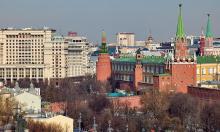Russia to punish other countries for banning Russian language
The Federation Council raised the issue of sanctions against the countries that infringe upon the right of Russian-speaking citizens to use their native language. Russian senators are to develop proposals on restrictive measures in the near future before they can be submitted for consideration to the government.
The move was based on yet another appeal to international parliamentary organizations, parliaments and the public with a call to protect the right to use native language and conduct educational programs in it. The Federation Council approved the appeal on June 2. During the discussion, the senators raised the question of how long they would have to continue approving such documents and whether it was time to move on to action.
"Don't you think that, in parallel with this appeal, we should have sent another appeal to our government requesting economic sanctions be introduced against the countries that have been violating both the rights and the law on the Russian language and the rights of Russian-speaking citizens for many decades. Maybe it's time to take economic action against those countries and sell them less gas, oil and so on," Svetlana Goryacheva, a Senator from the Far East (Primorye region) said.
Chairwoman of the Federation Council Valentina Matvienko supported the proposal.
"Why do we have to try to persuade all the time? This is certainly necessary, but maybe we need to take different measures against the already persistent violators of the rights of Russian-speaking citizens to bring them to their senses?" the speaker of the upper house of the Russian parliament was quoted by TASS.
Matvienko instructed the committees for international affairs, education and economic policy to elaborate appropriate proposals.
One shall assume that it goes about the Baltic States and Ukraine. It is worthy of note that trade and other economic cooperation with these countries has been declining during the recent years.
For example, the cargo turnover of the Port of Riga in 2020 amounted to 23.7 million tons of cargo, which was 27.6% less than a year earlier. The pandemic has contributed to the decline, of course, but the coronavirus is not the only reason. The port was a transit point for large volumes of Russian exports — coal, petroleum products, chemical products, and so on. The volumes of Russian cargo transportations have been declining steadily.
The situation is the same both at other Baltic ports and railway transportation.
Why didn't Russia use this tool before? The Russian authorities have been talking about the infringement of the rights of Russian-speaking populations for years already.
According to political analyst Alexei Mukhin, Russia should have taken such a measure long ago.
"Better late than never. I think that our MPs are trying to reflect on the topic of the increasing sanctions threats from the Western community against Russia and the Russian people,” the expert told Pravda.Ru.
It is not yet clear how long it will take to develop proposals, and when the Russian government is going to make a relevant decision based on those proposals. It will take a few months, to say the least. Nevertheless, this is not the case where one needs to rush.
Subscribe to Pravda.Ru Telegram channel, Facebook, RSS!





